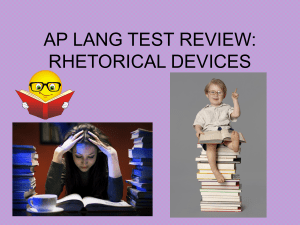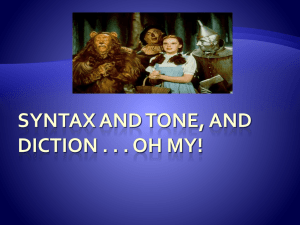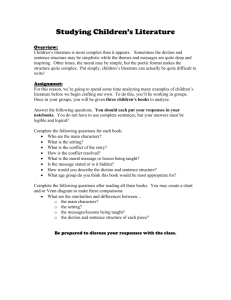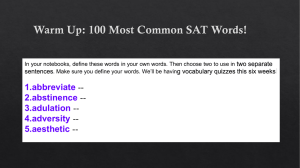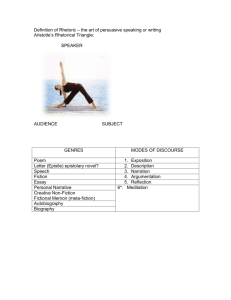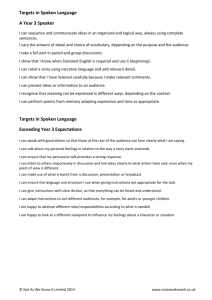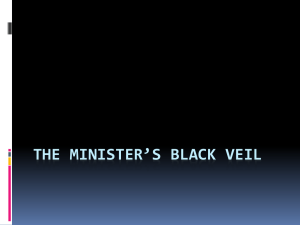Homework and Class Work for ENG 100/AP Wednesday, Sept. 26, 2012
advertisement
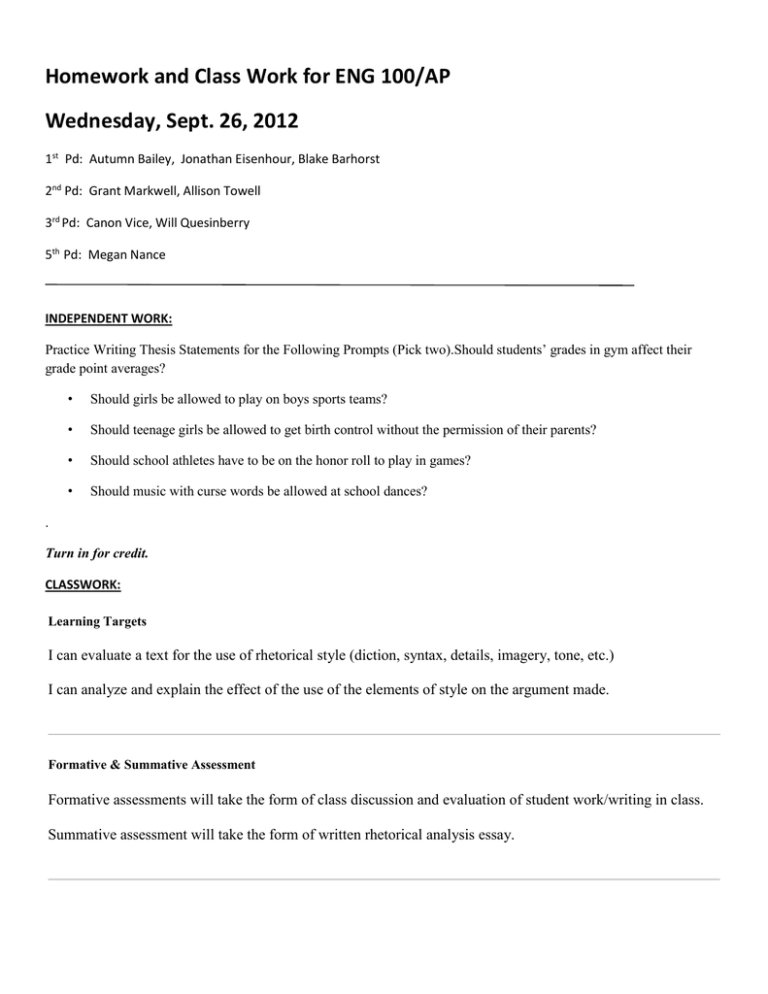
Homework and Class Work for ENG 100/AP Wednesday, Sept. 26, 2012 1st Pd: Autumn Bailey, Jonathan Eisenhour, Blake Barhorst 2nd Pd: Grant Markwell, Allison Towell 3rd Pd: Canon Vice, Will Quesinberry 5th Pd: Megan Nance INDEPENDENT WORK: Practice Writing Thesis Statements for the Following Prompts (Pick two).Should students’ grades in gym affect their grade point averages? • Should girls be allowed to play on boys sports teams? • Should teenage girls be allowed to get birth control without the permission of their parents? • Should school athletes have to be on the honor roll to play in games? • Should music with curse words be allowed at school dances? . Turn in for credit. CLASSWORK: Learning Targets I can evaluate a text for the use of rhetorical style (diction, syntax, details, imagery, tone, etc.) I can analyze and explain the effect of the use of the elements of style on the argument made. Formative & Summative Assessment Formative assessments will take the form of class discussion and evaluation of student work/writing in class. Summative assessment will take the form of written rhetorical analysis essay. Student-Centered Learning Experiences AGENDA: 1. Independent Work Student will practice writing thesis statements from PPT prompts. These will be turned in and used in class on the following day. 2. Unfinished Business 3. Lecture - Analyzing for Style The analysis will form the body of the essay. This is where you will include a detailed explanation of the strategies used by the writer. We will work through the text chronologically again. Once we've done this several times, you will look for appeals and style together as you go through the piece from beginning to end. In terms of looking at the author's style we will focus on several main categories: 1. diction 2. syntax 3. details 4. imagery 5. tone 6. etc. c. DICTION- The words a writer chooses to convey a particular meaning Look for SPECIFIC WORDS or WORD PHRASES that seem stronger than others. Diction is NEVER the entire sentence. i.e. His adventures allowed him to slingshot around the world. VS His adventures allowed him to travel around the world. Look for a PATTERN (or similarity) in the words the writer chooses. Do the words imply a particular feeling? Sadness? Happiness? Etc? This pattern helps create a particular kind of diction. The pattern may also include REPETITION of the same words of phrases. Repeating the same word or phrase helps the reader emphasize a point, feeling, etc. Effective diction is shaped by words that are CLEAR, CONCRETE, and EXACT. Good writers avoid words like pretty, nice, and bad because they are not specific enough. Instead they rely on words that invoke a specific effect in order to bring the reader into their message. EXAMPLES A coat isn't torn; it is tattered. The US Army does not want revenge; it is thirsting for revenge. A door does not shut; it thuds. Diction depends on SUBJECT, PURPOSE, OCCASION and AUDIENCE. The SUBJECT often determines how specific or sophisticated the diction needs to be. For example articles on computers are filled with a specialized language: e-mail, e-shopping, web, interface, etc. Many topics generated special vocabularies to convey meaning. The writer's PURPOSE - whether to persuade, entertain, inform - partly determines diction. Words chosen to impart a particular effect on the reader reflect the writer's purpose. For example, if an author's purpose is to inform, the reader should expect straightforward diction. On the other hand, if the speaker's purpose is to entertain, the readers will likely encounter words used in ironic, playful, or unexpected ways. Diction also depends on OCCASION. Formal disction is reserved for scholarly writng and serious texts. Informal diction is often used in narrative essays and newspaper editorials. Colloquial diction and slang are typically used to capture the language of a particular time frame or culture. The type of diction a writer uses depends on the AUDIENCE (the readers or listeners). A speaker who uses sophisticated diction know he is writing for an intelligent audience. An author who uses mor informal diction know he is writing fo an audience of varied intelligence. SYNTAX - refers to the way words are arranged within sentences There are four categories we will look at when looking at syntax. They are: 1. Schemes 2. Sentence Length 3. Sentence Type 4. Punctuation d. SCHEMES Most English sentences follow a subject-verb-object pattern. (I.E. I went to the store.) Deviating from this pattern can serve to add emphasis to the author's ideas. See"Schemes and Tropes" handout. Read through. Be familiar enough with these to be able to recognize them in the text. e. SENTENCE LENGTH Another aspect of syntax is sentence length. Good writers will use a variety for emphasis. Short sentences - imply straightforward info or attitude Long Sentences - imply description, detail See"Some Guidelines for Choice of Sentence Structure" handout. f. SENTENCE TYPE A third aspect of syntax is sentence type. Again, good writers vary these. Look at the types of sentences the author uses – What is the effect? • • • • • • • • Simple: Subject - Verb (I went to the store.) Compound: two independent clauses joined by a conjunction (I went to the store, and I bought candy.) Complex: Independent clause and dependent clause (While traveling to the store, I saw my friend.) Compound-Complex: Two indepedent clauses and one or more dependent clauses (While traveling to the store, I saw my friend, and she gave me money for candy.) Declarative: a statement ( I went to the store.) Exclamatory: strong feeling (What a wonderful candy store!) Interrogative: question (Is this a store?) Imperative: command (Go to the store.) Look at or for a variety in the punctuation – What does this change do to the meaning of the text? • • • SEMICOLON: (;) gives equal weight to two or more independent clauses in a sentence. Writers use this to reinforce parallel ideas and show how both ideas are equally important COLON: (:) directs the reader's attention to the words that follow. Writers use this to show the reader that the information after the colon is important DASH: (-) marks a sudden change in thought or tone or sets off a brief summary TONE: It is a special kind of rhetorical strategy because tone is created by the writer's use of all of the other rhetorical strategies: • • • Diction and Tropes Syntax and Schemes Details and Lack of Details When discussing an author's tone, you must be careful to choose the right word. Distribute "List of Tone Words" handout. This is a small list of tone words. There are hundreds more. Use these in your essays to describe the tone of the piece but only if you are sure ou know the word's meaning (not sure- look it up in the dictionary). 5. Practice Analyzing Style: Diction, Syntax and Tone In AP ENG 100 student worked on analyzing his or her argument to analyze the diction for his or her rhetorical analysis paper.
